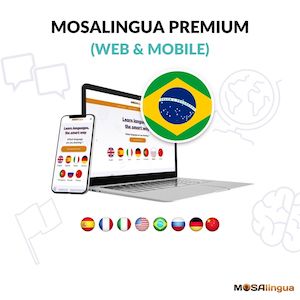Between the 2014 World Cup soccer championship and the 2016 Olympics, you might say that the Portuguese language has experienced somewhat of a boom in recent years! Portugal and Brazil are both beautiful and culturally rich tourist destinations. And Brazilian Portuguese is also an important language for business, as Brazil is South America’s biggest economic force. According to this article, UNESCO says that “Portuguese is the language with the greatest potential to become the international language of Africa and South America.” Currently, Portuguese is the 5th most spoken language in the world! (We even compiled a list of 11 great reasons to learn Portuguese.)
So why is it that so few Americans and English students and adults are interested in learning the Portuguese language?

How few, you might ask? According to one source, only 11 schools in the UK offer Portuguese as a foreign language option! And the situation isn’t much better in the US. Florida, one of the three main American destinations for Brazilian immigrants, had just three schools that taught the language in 2003!
Well, some people aren’t aware of just how important and influential of a language it is. And some just find it “scary” or “hard.” Are you one of these people who has doubts that are keeping you from diving in? Hopefully these three reasons will dispel some myths about how hard the language actually is, and change your outlook.
3 Reasons Why the Portuguese Language is Easy – Or At Least Not as Hard to Learn as You Think
We’ve written several articles about how easy or difficult certain languages are to learn, including one about the 10 hardest languages for English speakers. (Portuguese didn’t make the cut, luckily for you!) Just between you and me, it’s quite a subjective list. Why? Because many factors work together to determine how easy or difficult a person finds a given language. For example, their level of interest in the language’s culture, their opportunities for immersion and travel, their native language, and whether or not they know any other languages that might have some aspects in common.
Is Portuguese easy to learn? Today we’re arguing that “learning Portuguese isn’t as hard as you think it is.” Keep in mind: even if a language is “easy” to learn, that doesn’t mean you’ll be able to pick it up in a few hours with your eyes closed and your hands tied behind your back. It doesn’t even mean it’ll be a piece of cake without those added obstacles. It does mean that you will likely have an easier time learning Portuguese than you would learning Japanese or Arabic, for example, since these two languages have much less in common with English.
Now that we’ve cleared that up, let’s jump into our discussion.
Why do we consider the Portuguese language fairly easy to learn? In a nutshell, it’s similar to other Romance languages you might already know; it’s a common language online, so there’s lots of learning material to choose from; and Brazilian and Portuguese culture make learning in entertaining ways addictive!
Reason #1: Because If You Know One Romance Language, You Know Them All (Well… Almost)
Portuguese, like Spanish, is an Ibero-Romance language. These are languages that developed on the Iberian Peninsula and that have Latin roots (like French, Italian, and Romanian). So, if you’re lucky enough to have already learned one of these languages, you have a leg up on Portuguese.
I already know a Romance language!
Great! This is a pretty big advantage! Not only are you familiar with what language learning techniques work for you, but you can also use your Romance language knowledge to leverage your Portuguese learning.
First, you won’t be too intimidated by Portuguese grammar, since you already know how to make gender and number agreements, and memorize conjugations for different persons (there are only 4 in Portuguese, compared to 6 in most other Romance languages).
If you know Spanish, especially Latin American variants, polyglot Benny Lewis has some great advice for you. Knowing Spanish can be particularly helpful, but he also warns of some important differences. These include some different vocabulary and false friends (words that look the same but have different meanings in the two languages), as well as critical pronunciation differences.
If you know French, you’ll have a pronunciation advantage, as there are some similarities. For example, seeing the “ç” in many common words won’t freak you out: you already know how it is pronounced. Another similarity has to do with the different ways the letter “s” can be pronounced. Like in French, if it appears at the beginning of a word, or is doubled, like in “passado,” use an “s” sound. If it appears in the middle of a word in between two consonants, like the word “casa,” it should sound like a “z.”
What if I only know English (or other non-Romance languages)?
Even if you don’t know any other Romance languages, you still have a slight advantage, knowing English.
Of course, English isn’t a Romance language (it’s a Germanic language). But English does have some Romantic influence, particularly regarding vocabulary. English and Portuguese also share the same alphabet (with the exception of a few letters that don’t exist in Portuguese, and a few accents that we don’t use in English). Put those two things in your “win” column! Result: throughout your Portuguese studies, you’ll come across many words that have similar spellings and meanings in the both languages. How about some examples?
Does the word “informação” look familiar? Maybe not at first glance, probably because of the accents. But look closer. Surely you recognize the root, “informa.” Now, replace the “ção” with the ending “-tion” – information! There are lots of handy tricks for using the Latin root and replacing Portuguese suffixes to form English words. Can you figure out what the word “emoção” means? What about “resolução”? This blog provides a great list of common Portuguese endings and how they change in English.
Some fun Portuguese words to start training your ear.
Reason #2: Because It’s the 7th Most-Used Internet Language
New research shows that Portuguese is the 7th most-spoken language on the web. It ranks below English (1st), Spanish (4th), and French (6th), but represents 4.3% of all content available on the net. Okay, admittedly 4% is nothing compared to the 50+% in English… But 4% is enough to last you for YEARS. Plus, the Portuguese content that is available is easily accessible and mostly free.
If you want to learn the Portuguese language, you won’t have trouble immersing yourself in the language… without getting up off your couch. Here are some ideas to get you started.
- Reading in Portuguese on the Internet helps broaden your vocabulary and understand diverse sentence structures. The great thing about the web is that you can find short articles for any level and on any topic that interests you. We’ve included some of our favorite online resources at the bottom of this article.
- Listening to Portuguese will help you strengthen your comprehension skills, pick up on different accents, and make your intonation and word stress as natural sounding as possible. Listening exercises can come in many forms, including watching Brazilian news and TV online, watching movies and TV series, listening to the radio, or jamming out to Brazilian tunes. Once again, the link to some great Portuguese resources is at the end of the article.
- And most importantly, interact in Portuguese! Participating in forum discussion, and meeting Brazilians and other language learners via chat or webcam, allows you to put what you’ve learned into practice. As you start speaking with real people on a regular basis, your confidence—and your skill set—will grow exponentially.
Reason #3: Because Brazilian Culture is Rich and Fascinating!
Finally, to add to the previous reason: Brazilian culture is beautiful, and truly captivating (this article focuses on Brazilian Portuguese, but Portugal’s culture is also quite interesting!). Even without heading to Rio to see for yourself, immersing yourself in Brazilian culture from the comfort of your own home is a great way to learn the language quickly.
Portuguese language music
- Take advantage of the country’s diverse music scene: you may have already heard some Brazilian bossa nova, samba, funk, or sertanejo. If not, you can get a great intro to the genres with the selection of Brazilian songs on the Letras website. It’s awesome for language learning because you can search songs by artist or genre. Use the lyrics they provide to sing along. And of course, the Internet is a magical place. A quick search will turn up thousands of Brazilian songs. If you need some inspiration, try Seu Jorge, Arlindo Cruz, Diogo Nogueira, Gilberto Gil (classic), Caetano Veloso, Criolo (and many more!).
Sing sing along with Portuguese language YouTube music videos!
Movies
- Brazil has also put out tons of movies worldwide. Brazilian cinema started experiencing a boom in the early 1990s, and their films are well-known in Brazil and internationally. Maybe you’ve heard of Cidade de Deus (2002), which won several international film awards, or Central do Brasil (2008)?
Brazilian cinema has a strong cultural identity and often includes social critique (on topics like favelas, poverty, drought) and politics. If you’re a movie buff, here are some of our suggestions.
The possibilities are endless
- Tons of other pieces of Brazilian culture can help you improve your language skills. For example? Take a capoeira class – find out if there is a Brazilian organization in your city, as they often offer these. Or take other kinds of Brazilian dance classes, like samba or forro. Check out some Brazilian cookbooks from your local library and try out some delicious new recipes… Make learning fun!
Now you have an idea of how rich Brazilian culture is, and how easy it is to find and access great resources for learning the Portuguese language. So, convinced yet?
Learn More About the Portuguese Language
Great, you’re excited to get going on your Portuguese language journey! Here’s how you can take the next step.
- Tap into our free Brazilian Portuguese learning resources
- Download the MosaLingua app for learning Portuguese
- And read about our tips on how to learn Portuguese quickly
If you’ve found other helpful online learning resources for Portuguese language learners that make learning Portuguese easy, consider sharing them with our community. Post them in the comments section below! Obrigado!
Related posts:
Start improving your Portuguese today
Want to improve your Portuguese?
Good news: we can help!
More good news: you can get started for free! With your free trial, you can test drive the most effective method for learning Portuguese for the next 15 days !Vocabulary flashcards, videos with subtitles, audiobooks, articles adapted to your level – with MosaLingua Premium (Web & Mobile), you’ll have access to all this and more. Get started right now. It’s free—and risk-free—to try!







Comments